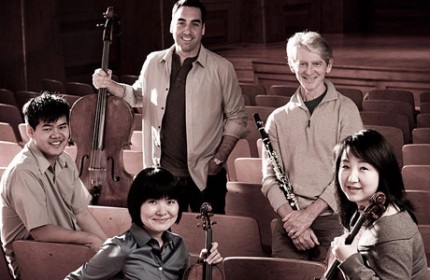Civitas Ensemble serves up a bracing mix of old and new
In a city as musically rich as Chicago, there is an abundance of worthy chamber ensembles, so many, in fact, it’s hard to keep track of them. That’s a good problem to have.
Among the groups that deserve to enjoy a higher local profile is the Civitas Ensemble, which performed Sunday afternoon at the Merit School.
Formed in 2011 with five members, the group is currently a quartet comprised of three Chicago Symphony Orchestra members—assistant concertmaster Yuan-Qing Yu, assistant principal cellist Kenneth Olsen, and clarinetist J. Lawrie Bloom—along with pianist Winston Choi. In addition to a laudable emphasis on contemporary music, the group, which is ensemble in residence at Valparaiso University, makes an equally admirable effort at community outreach, performing in schools and hospitals.
Presentation is informal and somewhat quirky with audience members called upon Sunday by Bloom to stand and read aloud the notes inserted in individual program books by number—either amusing or hokey depending on your viewpoint.
The Civitas Ensemble’s unusual forces can make programming something of a challenge, but in their offbeat concert, the musicians delivered an engaging, superbly played mix of standard repertory and contemporary music.
The concert led off with familiar fare, two cornerstone German works. Schubert’s Notturno, published after his death, was likely a discarded slow movement from either his Piano Trio in B Flat or another uncompleted work. Yu, Olsen and Choi offered an elegant, well-blended reading, more assertive in the impassioned middle section, and smoothly segueing into the reprise of the opening section in a quiet, glowing coda.
There’s something about Brahms’ late chamber works that make them eminently well suited to an autumn Sunday afternoon. Such was the case with Brahms’ Clarinet Trio, one of four late works the composer wrote for clarinetist Richard Mühlfeld.
The clarinet is primus inter pares in this work and J. Lawrie Bloom’s stylish, understated playing was fully in synch with the inward expression and strain of melancholy that imbue this music. The turbulent opening Allegro was strongly projected, with a conversational flow to the musical exchanges between Bloom, pianist Choi and cellist Olsen. The swaying Andante had the right relaxed swing, aptly grazioso, and the finale was boldly impassioned while keeping the music in scale.
The finest playing was in the Adagio, with all three men bringing out the Brahmsian vein of yearning and reflective nostalgia with a wonderful ease and natural ebb and flow.
To their credit, the Civitas musicians program new music in each concert, with the second half offering two recent works. While neither of the works is likely to scare the horses–or conservative listeners—both proved worth hearing.
Born in the Netherlands and raised in New Mexico, Peter Lieuwen was represented by his Gulfstream. Written in 2008 for the birthday centennial of Olivier Messiaen, the work employs the same instrumentation as Messiaen’s Quartet for the End of Time (which the Civitas Ensemble will perform next spring).
The aquatic inspiration is clear in the urgent running piano figure that opens the work, which soon passes to the cello and other instruments. This single-movement work suggests a more astringent Michael Torke, with populist jazz-minimalist touches and knotty contrapuntal vigor amid the driving momentum. The tempo slows down—much like the title current—for a more lyrical theme, played with pure and refined tone by violinist Yu. If Gulfstream goes on a bit too long for its material, the Civitas musicians provided Lieuwen’s work with fine advocacy and the piece afforded the opportunity to hear all four musicians perform together.
Paul Schoenfield is probably best known for his Cafe Music for piano trio. The composer’s 1990 Trio for clarinet, violin and piano is a more personal work, drawing on musical elements from Schoenfield’s Jewish background.
The opening “Freylekh” had an unmistakeable air of celebration, like wedding music, while the ensuing “March” contrasts with a jaunty, sardonic Prokofiev-like style, Yu making the most of an extended violin solo.
The klezmer element is very much to the fore in this work and Bloom’s playing was terrific—rich and febrile, the clarinetist even played with a sharpness to his tone to convey the raw folk-flavored origins. Bloom was at his finest in the pensive “Nigun” movement, bringing out the cantorial expression with an intimacy and wide range of coloring in this unsettled music. The trio is rounded off with a driving “Koztzke,” which provided a fiery and virtuosic finale to the afternoon.
The Civitas Ensemble will perform 2:30 p.m. November 17 at the Norton Building in Lockport. The program will include Beethoven’s Violin Sonata No. 1 in D major, Op. 12, No. 1; Brahms’ Clarinet Trio; John Mackey’s Breakdown Tango; and Paul Moravec’s Tempest Fantasy. civitasensemble.org; nortonconcerts.com.
Posted in Uncategorized





